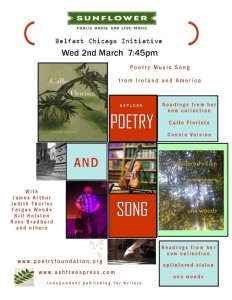BCATI is busy at the moment. We performed ‘A Day At Stateville’ at the Law School, Northwestern University on a snowy icy day in February to a large group of student lawyers. The view from the space we performed was spectacular. This is Lake Michigan frozen solid and Navy Pier in the background. In less than a couple of months this place will be full of beach bodies and yachts in full summer regalia- hard to imagine. 
The reading and subsequent forum theatre skit was highly effective as usual and provoked passionate discussion and audience interaction around the issue of medical health care and human rights negligence in the prison. Several lawyers in training shouted ‘stop!’ and got up to take the place of the protagonist with severe stomach problems unable to receive appropriate medical attention. A young woman suggested saying ‘I’m dying!’ Another woman suggested profusely vomiting- the men said this would not be taken seriously either that he’d be simply given pepto-bismol. 
Another young man took his seat on the stage next to Josh and tried to convince the guard to get him a doctor- all to no avail.
I then took my third SAIC workshop with Trevor Martin at the School of the Art Institute. This was a further opportunity to both share my research and introduce the under grad Performance Art students to the tools and theories of Theatre of the Oppressed and Augusto Boal. They always love these games and the discussion where I describe how they have such practical and empowering ‘real life’ applications in social justice and activism. We ended the session with a replication of the ‘medical scene’ and the students also intervened to attempt to correct the oppression of the ailing protagonist.It is increasingly obvious to all the ‘spect-actors’ as we continue to perform this forum that the prisoner has no way of pursuading the guards and the prison that he needs urgent medical attention other than literally passing out nearly dead on the floor. Thanks to Karen Daniel of Northwestern for inviting us! 
While I was at the Art Institute I had the pleasure of attending “Reading The Room: The Art Museum as Choreographic Architext.” Dr. Amanda Jane Graham, Mellon Postdoctoral Fellow in Dance Studies at Northwestern University, discussed how Trisha Brown’s and Simone Forti’s dances of the 1960s were informed by ‘architexts’, or choreographic scores determined by architectural elements. Extending the concept of the architext to contemporary art museum performances by choreographers and artists including Maria Hassabi, Sarah Michelson, and Brennan Gerard and Ryan Kelly, she traced the corporeal history of “reading” a room through the dancing body- reminding me of the importance of the space in which we perform and how our creative activities and outputs always contain embodied elements of our stories and environments thus rendering everything subjective: this can be celebrated and used effectively to disseminate our research and passions.
In other news, I am delighted to have been commissioned by the Chicago Arts Partnership in Education CAPE to write an evaluative report looking at one of their artist/teacher collaborative programmes: ‘Collaborative Laboratory’. I will complete an Interpretative Phenomenological Analysis and compile Affective data as developed in my doctoral research. This follows on from the evaluative report I completed for Niall Rea and the TheatreofPluck D.R.A.G. which looked at the audience impact of D.R.A.G Divided Radical And Gorgeous, a one man/woman show devised in collaboration with Belfast drag-performance artist, Trudy Scrumptious, looking at issues of the LGBT community in the years of conflict and post-conflict Belfast.
Also forthcoming with BCATI is a full day workshop at St. Patrick’s Catholic School for Boys in Chicago’s Portage Park neighbourhood in TOP and ‘A Day at Stateville’, and a trip to New York City where I will be giving a research presentation at their annual NYU Forum on Educational Theatre. This will be my third attendance at the Forum which is always stimulating, educational and inspiring and so important to connect, share research and practice and feel part of an international community. 
As well as all that, we recently launched Una Woods new collection of poems ‘splintered vision’ in the Sunflower Public House and Live Music in Belfast.  We had guests Connie Voisine and James Arthur read from their new collections and wonderful singing and music to accompany. We are hoping to host a sister event here in Chicago with the support of the fantastic Ireland Network, Chicago later in the month.
We had guests Connie Voisine and James Arthur read from their new collections and wonderful singing and music to accompany. We are hoping to host a sister event here in Chicago with the support of the fantastic Ireland Network, Chicago later in the month. 
I’m sure there’s more- Happy St. Patrick’s Day to all- we are heading downtown Chicago tomorrow and Naoise my son and his friend Demetrius are marching with the Irish American Heritage Centre IAHC– exciting! Pics to follow.
Thanks for your support- and if you want to book BCATI for a workshop/presentation/forum theatre event please contact me here or at ellenanneschultz@gmail.com




